Hi, Mama.
Here’s wishing you a Happy (and very) Belated Birthday and also a belated Happy Mother’s Day! I can’t believe you’d have been ninety-six on May 17. It’s hard to believe you’ve been gone for thirty years, but I’m glad you’re with Dad now. I’ve missed you both and think of you both almost every day…still. You’re probably wondering why I’m writing to you after all these years, but I’ve wanted to tell you for a very long time how much you have shaped my life and to thank you for all you did for me. I am proud to be your son. I’m sure you heard it from Dad since I wrote to him first, but I wanted you to know that you are my hero. Yes, I told Dad in a letter to him a few months ago, but now I want you to hear it from me. You are the most amazing person, and by far, the strongest, most steadfast person I’ve ever known.
Things sure have changed here since you went home to God, but I think you know that. I’ll bet you’re glad you don’t have to teach under the conditions that many teachers do nowadays. It seems the kids have more rights now than those who teach them, and so many parents hold those teachers accountable for the failure of their children instead of the children themselves, or because those parents were too permissive and didn’t instill any respect or values in them like you and dad did with Jim and me. It doesn’t take “a village to raise a child,” it takes real parents like you were.

Mom, Grandpa Ariong, Uncle Tony, Grandma Naty, Uncle Severo
Do you know why you are my hero, Mom? It’s because you refused to be defeated throughout your life. You led a rather protected life in the Philippines, in a beautiful large house with manicured grounds surrounded by a high wall and gated where your family had maids, a gardener, a chef, a butler/chauffeur, and you even had your own maid. You played the piano so well you could have been a concert pianist. Your father was a city engineer for Manila, your family were frequent guests at the President’s palace and highlighted in the Society section of the Manila newspapers. Many of your relatives were either doctors, attorneys or senators in the Philippine government. You had it made.
You went to an all-girls Catholic school from grades one through twelve, and continued at a Catholic University until you were a sophomore and the Japanese bombed Manila during World War II. The incendiary bombs almost burned Manila to the ground, and your entire household packed all the food and family silver and left Manila on foot. Your beautiful home burned to the ground, and then your maid was shot by a Japanese sniper. Your father’s knowledge of the terrain surrounding Manila helped you escape the city by hiding out in the swamps, and it took you some time before you reached Baguio in the north, where you stayed with your aunt at her villa. When the Japanese finally occupied Baguio, I know they took your father to design and build bridges for them through the mountains and the swamps to help the Japanese keep supply lines open. That’s probably what kept the rest of your family safe. Still, your father was able to get information past his Japanese captors to the guerilla fighters so they could plant explosive charges and blow up his bridges after they were completed. You didn’t find out about that part until after the American forces landed and drove the Japanese forces from Baguio. I remember him as being one of the kindest and gentlest men I’ve ever known.
Isn’t that when you finally met dad? You told me the American forces asked permission of your aunt to set up their headquarters on her property near her villa and she consented. Dad was one of the general’s aides, wasn’t he? I know that you told me you met at a dance and he was such a handsome soldier. He was a major by then, wasn’t he? I’m thankful you told me these things, Mom. I thought it was so respectful of Dad to ask your father for your hand in marriage, and incredibly insightful of your father to tell him yes, but only under the condition that he had to return to the United States when the war ended, think it over, and if he was serious and truly loved you, he would return to the Philippines to marry you. I guess you know the answer to that, don’t you?

Mom’s and Dad’s wedding photo, July 1946
He did! I’ve seen the photos of you both when you were living in the Philippines and Dad worked for the State Department, and then with me as a baby. You both were so young and such a beautiful couple. I know it had to be difficult to make the decision to leave your home, your family, your country to accompany Dad back to the United States to really begin your new life. I know it was even more difficult to end up living next door to Grandma and Grandpa Ellison, especially when Grandma Ellison didn’t think you were good enough to marry her only son because you were Filipina and Catholic. Wow. Two strikes right there. I think the single, saving grace was the kindness and acceptance of us by Grandpa Ellison. He was a good man, and I can see where Dad got his character and his values. In a way, I can understand why we ended up living beside Grandma and Grandpa Ellison. Dad was their only child and loved his parents very much.

Dad, Mom, and me at one month
I know it was difficult for you, Mom, but you must know that Dad loved you so much and was so proud of you, regardless of what Grandma thought, or thought she wanted for him. He knew what he wanted…you! I know that. I could see it whenever he looked at you. You knew nothing of housekeeping, washing clothes or cooking when you first came to the U.S., but you learned. All you knew how to do was to play the piano. I still have your first Betty Crocker Cookbook. I also know that Dad spent an inordinate amount of time away from home because he was building his dream, the resort. He wanted that resort so much and he wanted it to be a success to provide for you. I know those years were tight, especially when you gave birth to Jim. You even learned to sew and used to buy material to make our clothes. Do you know that I still remember the Davy Crockett flannel shirt you made for me? I loved it, Mom, because it was a Davy Crockett shirt, and that you made it for me. And I loved all the sweater vests you made for me, too. I was proud to wear them.

That’s me, holding my 1 month-old brother, Jim
I also know it was a little easier when Dad and Sig Stockholm built our new home a bit farther away from Grandma. It almost seemed we were in a different world there and we could breathe easier. I know that your dad designed it and that the mahogany ‘tiles’ for the walls was Philippine mahogany. Bill Permenter built our beautiful Arizona sandstone fireplace. It was beautiful home, Mom, and Dad wanted that for you and all of us.
You even became a Naturalized Citizen of the United States! I remember the day we all went to Seattle to watch you and be with you when you took the oath to become a citizen. You studied for the exam, aced it, and then you became an American Citizen. I know how proud you were, and I know how proud Dad was of you! It wasn’t too long after that when you were asked to teach Spanish at Langley, was it? I remember the State of Washington even granted you a special certificate to teach, even though the war interrupted your college education in the Philippines. You taught, and then went to the University of Washington during the summers to get your degree. You stayed at the dorm during the week and came home on weekends. I took care of Jim, Dad took care of both of us and ran the resort, and you studied so hard and did so well. I remember the summer quarter that you challenged some classes and got twenty-two credits! You were amazing! I also remember how angry you were when you got a B. You graduated with a degree in Romance Languages with a minor in Education, and you got your Phi Beta Kappa key, too. No more special certificate for you! You even got your Master’s Degree. We were all so proud of you! I still am.
Everything you did, you did to the very best of your ability. You could have been a concert pianist, Mom. Though you weren’t, you gave me my appreciation for music. One of my first memories was when I was three and we lived in the ‘little house’ next to Grandma’s. I dragged a cushion off the couch, put it on the floor and sat on it. You were playing a Rachmaninoff concerto and when I leaned back against the side of your spinet piano, I was shocked to be able to not only hear the music, but to feel it all the way through my back to my breast bone and forehead. I could feel the emotion with which you played, Mom, and it has stuck with me all these years. When I sing in church with our praise team band, I sing that way…with emotion. Music became a salve for my soul a long time ago because of you! Thank you for that gift. I wish you could have heard me sing in church just once. It’s okay, though, because not even the boys have ever heard me sing in church, either.
I know that I had you and dad wondering where you went wrong with me because of some of the things I did and the decisions I made, probably from the age of ten on. I know I caused you a lot grief but I was trying to find out who and what I was and where I fit, and have some fun along the way. I must tell you that I had a tough time trying to live up to your expectations especially in high school and college, and I rebelled big-time. You were a tough act to follow. Although I made some wonderful friends at Oak Harbor, I wish you had never taken me out of Langley at the end of my sophomore year. I felt that I was just beginning to grow as a person, a student and an athlete, and then I had to start over as a junior at a new and larger school. Yes, I did okay. I made some new friends there that I still have, but I did feel a bit displaced my junior year. You and Dad pushed me hard, especially after you made me take that IQ test. I know it was a test for ‘potential,’ but I felt doomed when the results came back and knew you’d want me to live up to my score. It was brutal, Mom. I hated it because I wasn’t you.
I still graduated in the upper fifth of my class with a 3.14 grade point average, and did get accepted to Washington State University. I thought I wanted to be a civil engineer because that’s what your and Dad’s vision was. I took a load of math, chemistry and physics classes, along with some general engineering classes, and began to realize it was not what I really wanted. You wanted me to follow in your father’s footsteps, but after the first year, I was only an average student because I was beginning to feel that I didn’t want to be a civil engineer. I had no passion for it. It only took the next semester to show that, and because of the heavy partying and, to put it mildly and succinctly, my unruliness, the Dean of Men finally invited me to his office, made me pay for a replacement door to my dorm room because of the burn marks, and told me I had three days to get off his campus and to never return until he was dead. I know that was not your vision, nor was it exactly mine though it served my purpose…I got out and had a lot of fun before I left.
You know I spent the next year at Everett Junior (now Community) College, trying to raise my grade point average, but I was only wasting my money and time, so I dropped out and joined the Army. Lynn’s death had a lot to do with that, too. From that point, it took two years, nine months, nine days, one hour and forty minutes worth of the U.S. Army, including duty stations at Fort Lewis, Washington, Fort Ord, California, Fort Gordon, Georgia, Fort Lewis, Washington, Cu Chi, Republic of Vietnam, a plane crash in Anchorage trying to return to Vietnam, and finally the burn ward at Brook Army Medical Center at Fort Sam Houston, San Antonio, Texas before I saw home again for any length of time. It was a rocky ride and a tough trip, but I made it back. Had all my promotions been ‘linear,’ I’d have gotten out as a Command Sergeant Major. As it was, I was lucky to get out as a Specialist 4th Class. I was told I had an anger-management problem. Anyway, the physical scars healed a lot quicker than the mental and emotional scars. It seems I still pick the occasional scab off one of them now and then, and have to let it scab-over again, trying not to pick at it until it heals and just itches occasionally.
I must tell you, though, that I enjoyed the brief time I spent at home after I was discharged from the Army because we finally got to talk about life after those hectic years, and I got to know you and Dad more as people than just “Mom and Dad.” I was grateful and quite surprised that you apologized to me for pushing so hard after you saw my IQ test score, and for not asking what I wanted to be when I grew up. I had to gently remind you that once, while I was in high school, I did tell you and Dad what I wanted to do, but I was outvoted. I wanted to buy an old sportscar and restore it so I could drive it to school. I was already working summers, and I had a plan to work after school to make even more money so I could afford to buy parts and still save for college. But both you and Dad said no. Neither of you wanted me to be a mechanic and that I should be a civil engineer instead. Dad said I’d be spending every spare moment working at some job or on the car instead of doing my homework. He was probably right, but at least he’d have known where I was on weekends. That’s when he bought that blue ’58 Volkswagen Bug and told me I could drive it and learn how to maintain it. It was like the time he taught me how to drive that old ’53 Chevy dump truck with a four-speed, non-synchromesh transmission when I was fifteen. He told me if I could drive that thing, I could drive almost anything on the planet. That was a lot of fun. As for the VW, well, I did learn how to tune it up and maintain it, and I was grateful for it, but it wasn’t exactly what I had in mind.
It took a while, Mom, but that time at home helped. I decided I could try to combine whatever engineering and math I learned with the drawing skills I learned from Professor Douglas. I decided I was going to go back to school to become an architect, so I did, and I did well this time. After four straight quarters at Shoreline Community College, I graduated with an Associate’s Degree in Arts and Sciences with a 3.8 grade point average, taking physics, calculus and art classes. I was accepted into the University of Washington School of Architecture and Urban Planning. I was on my way.
Anyway, I guess life got in the way and you sort of know the rest. I met a girl, got married, we had a son, I dropped out of school, got a job at Seafirst Bank using what education I had and became a space planner, a project coordinator, a project manager, had another son, became a Purchasing Officer and furnished bank branches and administrative offices across the state, and was drinking too much. I guess the stress of work and family life and those old mental and emotional scars were too much of a load for me to carry. Then, very suddenly, Dad died. I was numb. I know you were devastated. I wish I could have helped you more emotionally, Mom, but I didn’t know what to do except, with the help of Jim, take care of the bills, make the burial and memorial service arrangements, and let you grieve. I wish I would have known what to do. All I could do was be there. Along the way, my home life suffered, and I didn’t get to grieve for Dad.
I began to drink even more, thinking I could anesthetize myself from the stress and pain, but it didn’t work. On June 12, 1980, I took my last drink and checked into a treatment center. I was a hot mess. Twenty-eight days later, I emerged sober but still wanting to drink. Thanks to AA, I didn’t. Shortly afterward, the nine-year marriage ended. I left the bank and went to work for a commercial furnishings dealership with the idea that I could use my experience from the bank to make it as a salesperson, space-planner, and custom furniture designer. It was about this time that I married Lou. I knew her from my days at Seafirst. My “success” sure took a while…like almost eleven years, which included a six-year stint with two custom furniture manufacturers and another five years as a partner in a minority-owned commercial furnishings dealership. I did okay, but not as well as I’d wanted.
It was about a year after I became a partner in that minority-owned dealership that you died, Mom, just over ten years after Dad died. Once again, life got put on hold as Jim and I took care of the estate, the will, the bills, and your memorial service and funeral arrangements. I missed you, Mom, and didn’t get a chance to grieve for you. Your leaving us left a big hole in our lives. We left the house pretty much as you did for a few years until we decided that it was time for us to cut the ties to the island and sell the house. Neither of us had the time to take as good care of the house as we would have wanted.
About the time Jim and I sold the house, I adopted Lou’s sons, Craig and Blake. I’m glad I did. Four years or so later, I got this great job at another dealership as a GSA salesperson where Lou worked. I got to use everything I had ever done before to become successful as a GSA salesperson to the U.S. Navy, the U.S. Air Force, the Coast Guard, NOAA, and the U.S. Army, doing their space planning, specifying their furniture, designing custom furniture for conference and reception areas, selling it all to them, and managing the electrical work, and the delivery and installation of their new furnishings. The last ten years I worked there, I never had to make a “cold call.” The dealership was sold in 2001, renamed and moved from Seattle to Bellevue, and Lou I worked together for fifteen years total before we retired in March of 2009.
We had one good year together as retirees before Lou was diagnosed with brain cancer. She died eight months later, on Dad’s birthday in 2010. It was her third bout of cancer since 2005. It was then I realized what you went through when Dad died. The pain and loneliness was unbelievable. I think I was able to finally grieve for Dad and for you, too, after all those years. I must say that it took a while before I grew accustomed to my ‘new normal’ of being alone. Joining a bereavement group was a big help to me. I wish I would have known enough when Dad died to try to find such a group for you, Mom. It wouldn’t have been quite as lonely to be with those who truly understood what you were going through. I believe it would have helped you emotionally. I’m so sorry for that.
About seven months after Lou died, I went on my first road trip alone. I sure cried that first day because it was the first time in over twenty-eight years that I went on vacation without Lou. I was so surprised when it got better every day after that. At the end of two weeks, I had travelled about three thousand miles to places I’d never been and took about 1,400 photos of Paradise, Lake Oroville, Lake Tahoe, Heavenly Valley, San Jose, Carmel, and Monterey, California. Two weeks later, I went to the family reunion in Lakeside, Montana near the north end of Flathead Lake. On a whim, I went to Glacier Park, drove around the eastern side of Lake Coeur D’Alene, Idaho, and stopped at the Columbia River overlook just east of Vantage. Once again, I took another 1,400 photographs and travelled close to 3,000 miles again. I was a new man, Mom. Life had become exhilarating again!
Then, about nine months after Lou passed away, and almost three weeks after I returned home, I met Debbie. It felt as though we had found each other after never expecting we’d find anyone! We fell in love three days after we met, hiking and photographing at Paradise on Mount Rainier. It was idyllic and fitting for us. You’d like her, Mom. You’d love her, too. She’s so good to me and for me. I’m truly happy again. I’ve been blessed beyond measure!
For someone who didn’t want any drama in his life, I guess I created a lot of it around me just because I didn’t think about consequences with regard to others…especially you and Dad…and I’m so sorry for that. As I seem to have 20/20 hindsight, I can’t shake the feeling that I failed you and Dad numerous times when I was younger. It almost feels as though I blundered my way through the china-shop of life, breaking a lot of things as I bulled ahead…and sometimes backward. I honestly didn’t expect to live this long. I expected you and Dad would outlive me, but instead, here I am. Since I am not blessed with the gift of foresight, I have no idea what my purpose is. I simply keep living a day-at-a-time, as best as I can, and as I always have done. Yes, I do make some plans, but they’re more rough outlines until I get close enough to figure out what I’m going to do once I get there. I hope, though, that I have made you a little proud of me along the way, even if it’s nothing more than I’ve managed to survive things that killed others. Yes, I know I’m a bit too glib.
I’m sorry this is so long, but I wanted to tell you these things. You are still, and always will be, my hero. I love you, Mom, and miss you so much. Still.
Your son,
Bob
PS – Is there golf up there? Just wondering…I’d dearly love to play one more round with Dad. Please tell him ‘hi’ from me, okay?







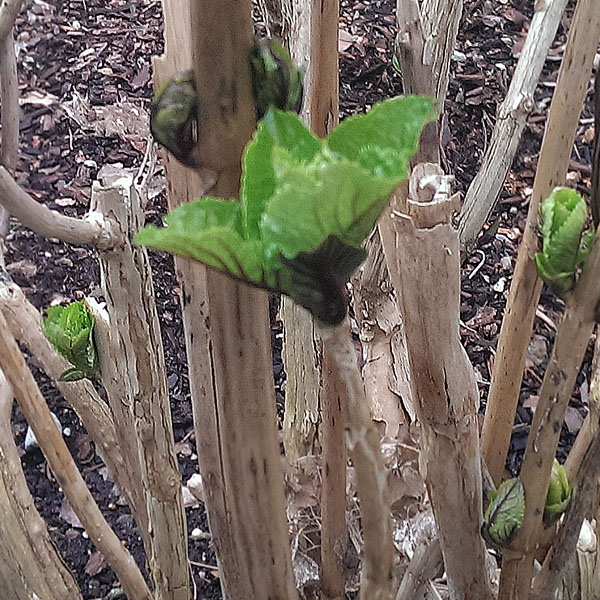
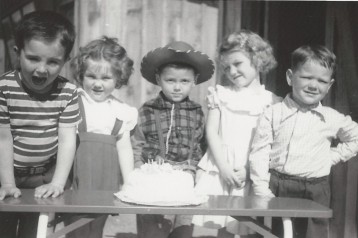
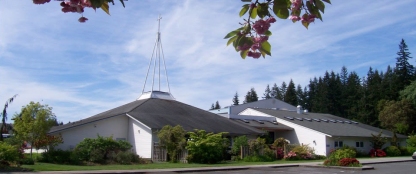
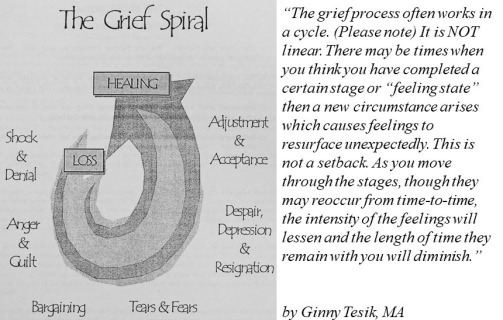 subsided to become the most paralyzing ache I had ever experienced, and I wanted to die just to be with her and to stop the pain, the ache, and the loneliness.
subsided to become the most paralyzing ache I had ever experienced, and I wanted to die just to be with her and to stop the pain, the ache, and the loneliness.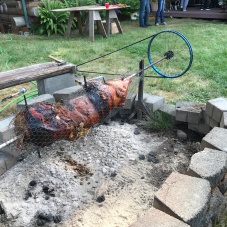 Oh! And the pig roast? It was amazing and a wonderful way to end that long, emotional, and thoughtful day on Whidbey Island with so many people who are becoming closer friends.
Oh! And the pig roast? It was amazing and a wonderful way to end that long, emotional, and thoughtful day on Whidbey Island with so many people who are becoming closer friends.
 here I am. I know, though, that I could go at any time for any reason. It says in the bible (paraphrased) that only God knows the number of our days. I believe that, but I do try to be as healthy as I can…now. The reason for that, for me, is a quality of life issue as well as being blessed with another Great Love…my Debbie. I want to be as healthy and active as I can, experiencing the joys of sharing life and love with her right up to the time I drop. I’ve always joked that I want to be sliding sideways, dirty, naked and broke, right into the grave, completely used up. I’m afraid there’s more truth to that than many believe.
here I am. I know, though, that I could go at any time for any reason. It says in the bible (paraphrased) that only God knows the number of our days. I believe that, but I do try to be as healthy as I can…now. The reason for that, for me, is a quality of life issue as well as being blessed with another Great Love…my Debbie. I want to be as healthy and active as I can, experiencing the joys of sharing life and love with her right up to the time I drop. I’ve always joked that I want to be sliding sideways, dirty, naked and broke, right into the grave, completely used up. I’m afraid there’s more truth to that than many believe.
 In my “tweens” and teens, I learned that being in nature calms me. To sit on a log by a small stream in the woods, seeing the rays of filtered sunlight highlight a thick carpet of moss is like a salve for my mind and soul. It was more beautiful than any cathedral and made me feel closer to God. Sitting next to a creek, swollen with snow melt, hearing and seeing the water rushing past me makes me feel as though any worries, any sadness, any anger can be washed away and dissipated. I feel renewed afterward. Standing on a beach in the middle of a storm with the rain stinging my face, tasting the salt spray from the waves crashing on the rocks, and screaming in anger and frustration into a wind so strong it whipped Puget Sound into whitecaps and ripped the sound of my voice away, was cleansing. I learned how small and insignificant I was in the grand scheme of life, and that I was not the center of the universe.
In my “tweens” and teens, I learned that being in nature calms me. To sit on a log by a small stream in the woods, seeing the rays of filtered sunlight highlight a thick carpet of moss is like a salve for my mind and soul. It was more beautiful than any cathedral and made me feel closer to God. Sitting next to a creek, swollen with snow melt, hearing and seeing the water rushing past me makes me feel as though any worries, any sadness, any anger can be washed away and dissipated. I feel renewed afterward. Standing on a beach in the middle of a storm with the rain stinging my face, tasting the salt spray from the waves crashing on the rocks, and screaming in anger and frustration into a wind so strong it whipped Puget Sound into whitecaps and ripped the sound of my voice away, was cleansing. I learned how small and insignificant I was in the grand scheme of life, and that I was not the center of the universe. As a “tween” and teen, the music of the day…rock and roll, ‘soul’ music, and pop or ‘cross-over’ music from pop and country artists…was all over the radio. I listened to two radio stations then, KJR and KVI and found that different songs fitted the different moods, problems, and heartaches I had at the time. In the privacy of my room, I listened to those songs and sang them. I found that the music was a salve for my soul and I wanted to learn to play them. I had made enough money doing odd jobs that, by the time I turned sixteen, I bought myself my first guitar and a book of chord diagrams. It was a Sears Silvertone F-Hole acoustic guitar with an arched top, in black and white. It cost me fifty dollars, which was big money for me then. One of my friends who was a couple of years older and played guitar, taught me how to barre chord and that most of the songs on the radio were either three or four chord progressions. I picked that up fast. I would sit in my room, listen to the radio, and became good enough to play along with most of the songs I heard. Music does soothe the savage beast.
As a “tween” and teen, the music of the day…rock and roll, ‘soul’ music, and pop or ‘cross-over’ music from pop and country artists…was all over the radio. I listened to two radio stations then, KJR and KVI and found that different songs fitted the different moods, problems, and heartaches I had at the time. In the privacy of my room, I listened to those songs and sang them. I found that the music was a salve for my soul and I wanted to learn to play them. I had made enough money doing odd jobs that, by the time I turned sixteen, I bought myself my first guitar and a book of chord diagrams. It was a Sears Silvertone F-Hole acoustic guitar with an arched top, in black and white. It cost me fifty dollars, which was big money for me then. One of my friends who was a couple of years older and played guitar, taught me how to barre chord and that most of the songs on the radio were either three or four chord progressions. I picked that up fast. I would sit in my room, listen to the radio, and became good enough to play along with most of the songs I heard. Music does soothe the savage beast. I also learned that, even through stretches of becoming a social and party animal, I needed alone time to recharge and re-center myself. I lived by Henry Van Dyke’s quote, “It is better to burn the candle at both ends, and in the middle, too, than to put it away in the closet and let the mice eat it,” much to my parents’ chagrin. And yes, I knew that quote as an early teenager. I would party until I dropped or was grounded. But when it was time to recharge, I would disappear from the social and party scene, sometimes for weeks. When I was grounded, I never made a scene or fought them. Most of the time, it was a relief to me that the only place I could go was to work and then home. It got me off the party merry-go-round and I relished the peace and quiet of being able to spend time alone to center myself. I learned that I was an introverted extrovert.
I also learned that, even through stretches of becoming a social and party animal, I needed alone time to recharge and re-center myself. I lived by Henry Van Dyke’s quote, “It is better to burn the candle at both ends, and in the middle, too, than to put it away in the closet and let the mice eat it,” much to my parents’ chagrin. And yes, I knew that quote as an early teenager. I would party until I dropped or was grounded. But when it was time to recharge, I would disappear from the social and party scene, sometimes for weeks. When I was grounded, I never made a scene or fought them. Most of the time, it was a relief to me that the only place I could go was to work and then home. It got me off the party merry-go-round and I relished the peace and quiet of being able to spend time alone to center myself. I learned that I was an introverted extrovert. used determines who or what is evil. I have learned that amassing a mountain of possessions will make one look successful, but does not guarantee success in life. I have learned that rushing through work, vacations, children, the journey through life without lifting one’s head to appreciate the scenery just to reach a destination, perhaps retirement, is not what life is about. The entire journey is the destination and what it’s all about! Stop to enjoy the sights, smell the roses, hug, love, and be with your children in the moment, be with whoever you’re with and wherever you are in the moment, watch the birds, wonder at clouds, let the beauty of a sunset bring you to tears, be honest but be kind about things, do the right things for the right reasons, do no harm, and love as though your heart has never been broken.
used determines who or what is evil. I have learned that amassing a mountain of possessions will make one look successful, but does not guarantee success in life. I have learned that rushing through work, vacations, children, the journey through life without lifting one’s head to appreciate the scenery just to reach a destination, perhaps retirement, is not what life is about. The entire journey is the destination and what it’s all about! Stop to enjoy the sights, smell the roses, hug, love, and be with your children in the moment, be with whoever you’re with and wherever you are in the moment, watch the birds, wonder at clouds, let the beauty of a sunset bring you to tears, be honest but be kind about things, do the right things for the right reasons, do no harm, and love as though your heart has never been broken.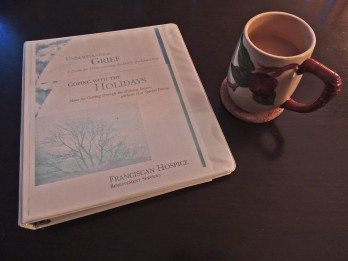 And when you have lost a loved one or a dear friend to death, grieve. It is natural and no one needs permission to grieve. Grieve as you will, as long and as hard as you need to because there is no right way or wrong way, nor is there a specific amount of time in which to grieve. Grief is an individual thing and must be dealt with or it will eat at you from the inside. Try to remember that the amount of grief you have is directly proportional to how much you have loved. Seek out others, such as a bereavement group, who are going through what you are because they will understand and accept you the way you are. There is strength in numbers, and a bereavement group is a safe place for your grief and your feelings. You will help each other, you will cry together, you will talk with each other, you will bare your feelings with each other, you will crawl together, you will eventually stand together, and you will become stronger together until you are able to face life again as your own person. Though it may hurt, give grief time, and don’t be hard on yourself. As Alfred Lord Tennyson wrote In Memoriam A.H.H., Canto 27 in 1849, per Wikipedia:
And when you have lost a loved one or a dear friend to death, grieve. It is natural and no one needs permission to grieve. Grieve as you will, as long and as hard as you need to because there is no right way or wrong way, nor is there a specific amount of time in which to grieve. Grief is an individual thing and must be dealt with or it will eat at you from the inside. Try to remember that the amount of grief you have is directly proportional to how much you have loved. Seek out others, such as a bereavement group, who are going through what you are because they will understand and accept you the way you are. There is strength in numbers, and a bereavement group is a safe place for your grief and your feelings. You will help each other, you will cry together, you will talk with each other, you will bare your feelings with each other, you will crawl together, you will eventually stand together, and you will become stronger together until you are able to face life again as your own person. Though it may hurt, give grief time, and don’t be hard on yourself. As Alfred Lord Tennyson wrote In Memoriam A.H.H., Canto 27 in 1849, per Wikipedia: Lastly, and I don’t care who knows or what they think, I believe in God and that Jesus the Christ is His son and died on the cross for my sins, and for the sins of mankind. I’ve believed for a long time, though for many years I thought He had deserted me. He had not. It was I who turned away from Him, and through Him found my way back. He was always with me. My belief helped me through my grief when I lost my wife to cancer in 2010. Though I was angry at God for my loss, I never lost faith in Him. I talked to Him, screamed at Him, and prayed to Him several times a day for weeks…and months…and when I was ready to listen, I was given answers in the most unexpected ways. Only once was my prayer answered as I asked, and that was when I prayed that He would take my wife home to Him so she wouldn’t suffer anymore. The next morning, after I had cleaned her up and put her favorite nightie on her and kissed her, with just a sigh she left me to go home with God. It broke my heart and it took a long time to heal, but with His help, I did. Though my other prayers were never answered as I asked, I always received more than what I needed when He knew I was ready. This I believe.
Lastly, and I don’t care who knows or what they think, I believe in God and that Jesus the Christ is His son and died on the cross for my sins, and for the sins of mankind. I’ve believed for a long time, though for many years I thought He had deserted me. He had not. It was I who turned away from Him, and through Him found my way back. He was always with me. My belief helped me through my grief when I lost my wife to cancer in 2010. Though I was angry at God for my loss, I never lost faith in Him. I talked to Him, screamed at Him, and prayed to Him several times a day for weeks…and months…and when I was ready to listen, I was given answers in the most unexpected ways. Only once was my prayer answered as I asked, and that was when I prayed that He would take my wife home to Him so she wouldn’t suffer anymore. The next morning, after I had cleaned her up and put her favorite nightie on her and kissed her, with just a sigh she left me to go home with God. It broke my heart and it took a long time to heal, but with His help, I did. Though my other prayers were never answered as I asked, I always received more than what I needed when He knew I was ready. This I believe.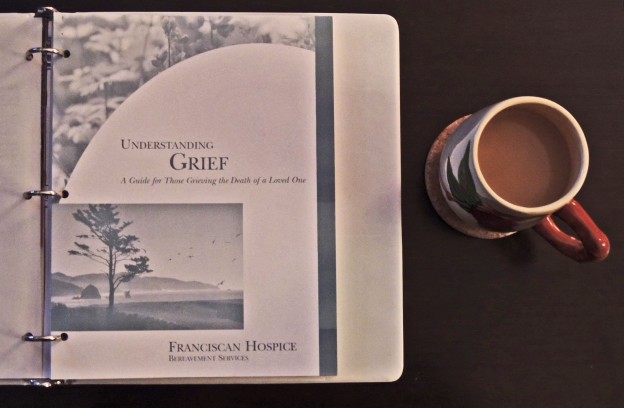
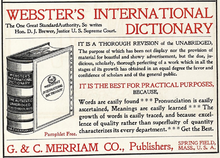 Per Merriam-Webster:
Per Merriam-Webster: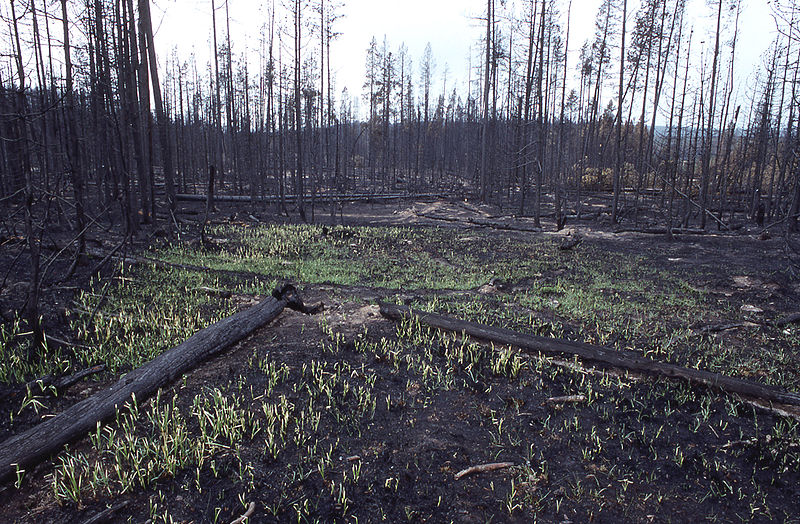 there was nothing left to fuel the fire. The embers would gradually cool and die, the rains would come and the ashes would soak into the wet ground, leaving a scar on the earth. In a while, though, dormant, protected seeds begin to sprout…from the underbrush as well as the charred trees. Sometimes, those seeds that sprout after a forest fire need that fire to be able to germinate. The scorched ground becomes as a newly-plowed field, and new growth…new life…begins to sprout and grow.
there was nothing left to fuel the fire. The embers would gradually cool and die, the rains would come and the ashes would soak into the wet ground, leaving a scar on the earth. In a while, though, dormant, protected seeds begin to sprout…from the underbrush as well as the charred trees. Sometimes, those seeds that sprout after a forest fire need that fire to be able to germinate. The scorched ground becomes as a newly-plowed field, and new growth…new life…begins to sprout and grow. Before my wife died, I wasn’t much of a writer. I don’t think I am now, though I have authored a book and write this blog. I’m guilty of rambling, but I do write from the heart. The reason I write is that I was told that I can put feelings into words that people can read and relate to. This became important to me after my wife died because, as a man, I didn’t know how to cope with the feelings of loss of someone I had chosen to love. I looked in the libraries, I looked on the internet, and I attended group bereavement counselling sessions, yet I could not find anything written by men for men who were grieving the loss of their wife. Yes, there was so much written about grief and what to expect in almost clinical terms, such as “You may have feelings of anger, at God or at your spouse for leaving you, feelings of loneliness, abandonment, guilt or despair. These feelings are normal.” Uh huh. It that all? This does NOT prepare one for the depth and breadth of those feelings, the pain of loss, of unrequited love, of loneliness, of utter desolation. Men are supposed to be tough, we’re supposed to suck it up and move on. I’ve always been a fighter. I’d have taken a bullet for her, I’d have taken her cancers from her and soldiered on, I’d have gladly taken the pain from her, but I couldn’t. All I was left to face were the horrid emotions of her death on my watch, a death I was powerless to stop. How do I fight that?
Before my wife died, I wasn’t much of a writer. I don’t think I am now, though I have authored a book and write this blog. I’m guilty of rambling, but I do write from the heart. The reason I write is that I was told that I can put feelings into words that people can read and relate to. This became important to me after my wife died because, as a man, I didn’t know how to cope with the feelings of loss of someone I had chosen to love. I looked in the libraries, I looked on the internet, and I attended group bereavement counselling sessions, yet I could not find anything written by men for men who were grieving the loss of their wife. Yes, there was so much written about grief and what to expect in almost clinical terms, such as “You may have feelings of anger, at God or at your spouse for leaving you, feelings of loneliness, abandonment, guilt or despair. These feelings are normal.” Uh huh. It that all? This does NOT prepare one for the depth and breadth of those feelings, the pain of loss, of unrequited love, of loneliness, of utter desolation. Men are supposed to be tough, we’re supposed to suck it up and move on. I’ve always been a fighter. I’d have taken a bullet for her, I’d have taken her cancers from her and soldiered on, I’d have gladly taken the pain from her, but I couldn’t. All I was left to face were the horrid emotions of her death on my watch, a death I was powerless to stop. How do I fight that?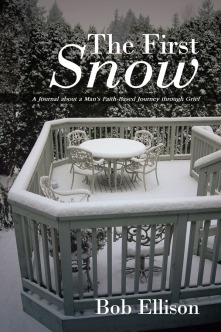 All this led to getting my journal published. I was encouraged by many to incorporate the emails I sent and some I received into the journal, so I did. Over four years after I began my journal, I submitted it to Westbow Press and the manuscript was accepted. After some reviewing and editing, it was submitted for publishing along with photos I took for the front and back covers, and it was published as The First Snow: A Journal about a Man’s Faith-based Journey through Grief. Because of my book, I was contacted by another author, Yvonne Broady, who wrote Brave in a New World: A Guide to Grieving the Loss of a Spouse. To shorten the story, we became cross-country friends via emails because of my book. She wanted to know how a man grieved, and we have since become like brother and sister though we’ve only met face-to-face on Skype. We shared our life experiences and got to know each other as if we were old friends. She is truly my sister.
All this led to getting my journal published. I was encouraged by many to incorporate the emails I sent and some I received into the journal, so I did. Over four years after I began my journal, I submitted it to Westbow Press and the manuscript was accepted. After some reviewing and editing, it was submitted for publishing along with photos I took for the front and back covers, and it was published as The First Snow: A Journal about a Man’s Faith-based Journey through Grief. Because of my book, I was contacted by another author, Yvonne Broady, who wrote Brave in a New World: A Guide to Grieving the Loss of a Spouse. To shorten the story, we became cross-country friends via emails because of my book. She wanted to know how a man grieved, and we have since become like brother and sister though we’ve only met face-to-face on Skype. We shared our life experiences and got to know each other as if we were old friends. She is truly my sister. The old cliché goes something like, when life gives you lemons, make lemonade. I can’t remember who to credit with the somewhat-cynical statement that said (paraphrased), if life gives you lemons, you can’t make lemonade without water and sugar. Well, in my case the water came from all the tears I shed, and the source of the sugar was the love and comfort I received from God, my family, a bereavement group, and my dear friends. It did take a while…a good long while…before I was finally able to make lemonade. But with a lot of help, I did. I hope now to be part of someone else’s recipe for lemonade by being a source of the sugar with whatever love, comfort, and help I can offer from my experiences.
The old cliché goes something like, when life gives you lemons, make lemonade. I can’t remember who to credit with the somewhat-cynical statement that said (paraphrased), if life gives you lemons, you can’t make lemonade without water and sugar. Well, in my case the water came from all the tears I shed, and the source of the sugar was the love and comfort I received from God, my family, a bereavement group, and my dear friends. It did take a while…a good long while…before I was finally able to make lemonade. But with a lot of help, I did. I hope now to be part of someone else’s recipe for lemonade by being a source of the sugar with whatever love, comfort, and help I can offer from my experiences.
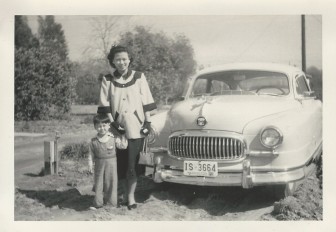 I remember the first time I began to realize that I was not the center of the universe. I was not quite four years old and observed that mom’s tummy was getting bigger. It was then that she and dad told me I was going to have a baby brother or sister. There was going to be a baby in the family. I wasn’t exactly excited for them…or for me. Suddenly, I knew I wasn’t going to be the center of mom’s attention. I began to feel somewhat displaced. I think my parents knew that, so they included me in the “we’re going to have a baby” thing. They began to
I remember the first time I began to realize that I was not the center of the universe. I was not quite four years old and observed that mom’s tummy was getting bigger. It was then that she and dad told me I was going to have a baby brother or sister. There was going to be a baby in the family. I wasn’t exactly excited for them…or for me. Suddenly, I knew I wasn’t going to be the center of mom’s attention. I began to feel somewhat displaced. I think my parents knew that, so they included me in the “we’re going to have a baby” thing. They began to  build me up by telling me that I was going to be the Big Brother, and that they needed me to help them raise my brother or sister, and that it was an important responsibility. They also told me that they would not love me any less, that life didn’t work that way. They told me that life was full of love and they would always love me, and they would love the new baby just as much as they loved me. The days were getting better.
build me up by telling me that I was going to be the Big Brother, and that they needed me to help them raise my brother or sister, and that it was an important responsibility. They also told me that they would not love me any less, that life didn’t work that way. They told me that life was full of love and they would always love me, and they would love the new baby just as much as they loved me. The days were getting better.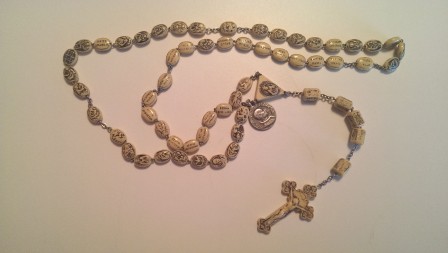 As a prelude to this, I must say that I believed in God and Jesus. I did have some problems with Catholic summer school around the age of twelve as I was being taught the Baltimore Catechism and was an altar boy. I had questions as to ‘why’ certain things were done and when they were mandated, such as, why did I have to confess my sins to the priest and receive penance to do? Why couldn’t I talk directly to God or Jesus and confess my sins directly to them? Was there a large “golden book” of penance? Was there a points system for various sins and was the penance, i.e. how many “Hail Marys” or “Our Fathers” or “Acts of Contrition, based on the points system? I just wanted to know. If I was going to be a good Catholic, I wanted to know why I needed to do these things, but that was just me and my curiosity. The sisters had no patience with me and either didn’t know the history or didn’t want to take the time to explain it to me. I have always suspected that they didn’t know the history and didn’t want to show their ignorance. They probably had learned it all by rote, and expected the same of all of us in the catechism class. So, I got whacked on the knuckles with a ruler a lot. It got bad enough that I didn’t want to be an altar boy anymore. For me, those were bad days.
As a prelude to this, I must say that I believed in God and Jesus. I did have some problems with Catholic summer school around the age of twelve as I was being taught the Baltimore Catechism and was an altar boy. I had questions as to ‘why’ certain things were done and when they were mandated, such as, why did I have to confess my sins to the priest and receive penance to do? Why couldn’t I talk directly to God or Jesus and confess my sins directly to them? Was there a large “golden book” of penance? Was there a points system for various sins and was the penance, i.e. how many “Hail Marys” or “Our Fathers” or “Acts of Contrition, based on the points system? I just wanted to know. If I was going to be a good Catholic, I wanted to know why I needed to do these things, but that was just me and my curiosity. The sisters had no patience with me and either didn’t know the history or didn’t want to take the time to explain it to me. I have always suspected that they didn’t know the history and didn’t want to show their ignorance. They probably had learned it all by rote, and expected the same of all of us in the catechism class. So, I got whacked on the knuckles with a ruler a lot. It got bad enough that I didn’t want to be an altar boy anymore. For me, those were bad days. My mom and dad were great teachers, great leaders, and incredible parents. They had taught me a lot about life and how to live it, through the good days and bad days. I needed to remember those things. They taught me that I should do the very best I could with the divine gifts that were given to me, and they taught me not to think too highly of myself because somewhere there was almost always going to be someone luckier, smarter, faster, stronger, and better than me at any given task I was performing, whether it was in the classroom, in music, in sports competitions, on the job, or in life in general. They taught me that people have different talents, and while some may excel at only one thing, others can have slightly lesser talents across a broader spectrum and be just as valuable because of those gifts. The ‘trick’ was to find that area where one could excel, or at least, where one could be successful. Only once in my life have I ever been ‘the best’ at anything, and that was when I won my fourth-grade spelling bee.
My mom and dad were great teachers, great leaders, and incredible parents. They had taught me a lot about life and how to live it, through the good days and bad days. I needed to remember those things. They taught me that I should do the very best I could with the divine gifts that were given to me, and they taught me not to think too highly of myself because somewhere there was almost always going to be someone luckier, smarter, faster, stronger, and better than me at any given task I was performing, whether it was in the classroom, in music, in sports competitions, on the job, or in life in general. They taught me that people have different talents, and while some may excel at only one thing, others can have slightly lesser talents across a broader spectrum and be just as valuable because of those gifts. The ‘trick’ was to find that area where one could excel, or at least, where one could be successful. Only once in my life have I ever been ‘the best’ at anything, and that was when I won my fourth-grade spelling bee. My life had many peaks and valleys, and occasions where I couldn’t tell one from the other. One occasion I remember was immediately following the plane crash in Anchorage that kept me from returning to Vietnam. Heavily sedated, burned, beat up, bandaged, unrecognizable, and lying in my bed in a room with two others, I watched and listened to a young man I knew, Private Charles Echols from Houston, Texas, die in his bed across the room, surrounded by doctors and nurses trying to keep him alive. He was nineteen. I was twenty-three. At that time, the line between a bad day and a good day blurred for me. I had thought then that Charles was having the better day, though later I would wonder why I lived and he didn’t.
My life had many peaks and valleys, and occasions where I couldn’t tell one from the other. One occasion I remember was immediately following the plane crash in Anchorage that kept me from returning to Vietnam. Heavily sedated, burned, beat up, bandaged, unrecognizable, and lying in my bed in a room with two others, I watched and listened to a young man I knew, Private Charles Echols from Houston, Texas, die in his bed across the room, surrounded by doctors and nurses trying to keep him alive. He was nineteen. I was twenty-three. At that time, the line between a bad day and a good day blurred for me. I had thought then that Charles was having the better day, though later I would wonder why I lived and he didn’t. almost fifty years, her brother-in-law, and one other family member in the span of two months. It was difficult for all of us, but we formed bonds and drew strength from one another. Now, just over six years later, four of our original twelve continue to meet for brunch every Tuesday. The oldest lady, Ellie, doesn’t come anymore because she is preparing her home for her daughter who is recovering from a stroke. She’ll be moving in with Ellie after she’s discharged from the rehab facility. The oldest man, R.J., passed away last December. Don has remarried and brings his wife to our Friendship Brunches now. The other two ladies, Sandra and Darlene, still attend as I do. We have survived and thrived. I am so happy to have found love again, too, and my days now are good. In varying degrees, I think all our days now are much better than they were six years ago.
almost fifty years, her brother-in-law, and one other family member in the span of two months. It was difficult for all of us, but we formed bonds and drew strength from one another. Now, just over six years later, four of our original twelve continue to meet for brunch every Tuesday. The oldest lady, Ellie, doesn’t come anymore because she is preparing her home for her daughter who is recovering from a stroke. She’ll be moving in with Ellie after she’s discharged from the rehab facility. The oldest man, R.J., passed away last December. Don has remarried and brings his wife to our Friendship Brunches now. The other two ladies, Sandra and Darlene, still attend as I do. We have survived and thrived. I am so happy to have found love again, too, and my days now are good. In varying degrees, I think all our days now are much better than they were six years ago.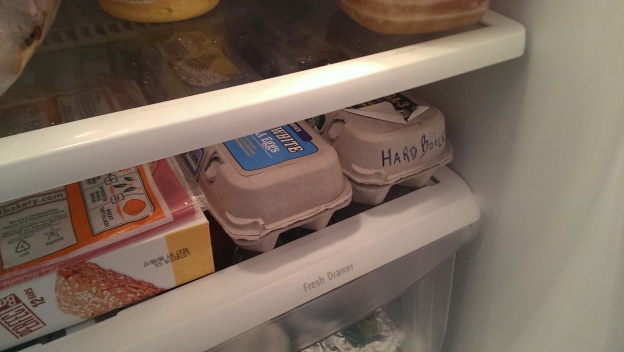
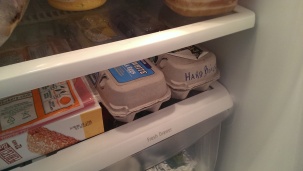 There are two egg cartons side-by-side atop the shelf covering the right crisper drawer. One is for hard-boiled eggs and is labeled so in small printed letters, and the other is for raw eggs. Since the carton for raw eggs is always on the right side next to the refrigerator wall, I grabbed an egg from that one to make a ham and cheese omelet. I already had preheated the frying pan and had melted coconut oil awaiting my egg, when I tried to crack it…and crack it again. It cracked, but wouldn’t open to spill its contents into the hot pan. I took a closer look at the egg and found it to be hard-boiled instead of raw. Hmmm. I opened the refrigerator, looked at the egg cartons only to see that they had been switched. I guess Debbie switched them when she was refilling the cardboard carton from the plastic, two-dozen egg carrier she got from Costco. That explained it. It was time to change plans.
There are two egg cartons side-by-side atop the shelf covering the right crisper drawer. One is for hard-boiled eggs and is labeled so in small printed letters, and the other is for raw eggs. Since the carton for raw eggs is always on the right side next to the refrigerator wall, I grabbed an egg from that one to make a ham and cheese omelet. I already had preheated the frying pan and had melted coconut oil awaiting my egg, when I tried to crack it…and crack it again. It cracked, but wouldn’t open to spill its contents into the hot pan. I took a closer look at the egg and found it to be hard-boiled instead of raw. Hmmm. I opened the refrigerator, looked at the egg cartons only to see that they had been switched. I guess Debbie switched them when she was refilling the cardboard carton from the plastic, two-dozen egg carrier she got from Costco. That explained it. It was time to change plans.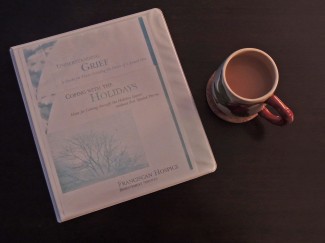 Those bereavement group sessions helped show me ways to begin to cope with that grief, and showed me ways to begin to unburden myself of it. One of the things that stuck with me was the recommendation to journal my feelings. I had already begun to do that when I was caring for my wife almost two months before she died. I did it to keep a record of what it was like to care for her, what it was like to cope with losing a bit more of her every day, of what it was like to see what hope I had left for a miracle cure erode by the day, and to show my sons…her sons…how much I loved her and would have gladly taken that bullet…that illness…for her. I wrote and wrote and wrote some more. I wrote about every aspect of my grief from every conceivable angle.
Those bereavement group sessions helped show me ways to begin to cope with that grief, and showed me ways to begin to unburden myself of it. One of the things that stuck with me was the recommendation to journal my feelings. I had already begun to do that when I was caring for my wife almost two months before she died. I did it to keep a record of what it was like to care for her, what it was like to cope with losing a bit more of her every day, of what it was like to see what hope I had left for a miracle cure erode by the day, and to show my sons…her sons…how much I loved her and would have gladly taken that bullet…that illness…for her. I wrote and wrote and wrote some more. I wrote about every aspect of my grief from every conceivable angle.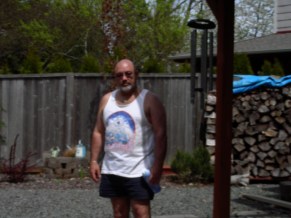 As spring drew near and the weather began to improve, I forced myself to go outside more. I could see that my back yard needed attention, so I finally began to weed and prune the shrubs and trees, and I began to redo my little pond…for me. I began to do things for me now, and to think of myself as an individual instead of the abandoned half of what used to be a team. That ‘habit’ was one of the hardest ones to break, but my back yard and getting my hands dirty to get that yard to where I wanted it was therapy for me. I began to really enjoy working in my back yard because I could see the day-to-day changes I was making in it…and in myself. Because of this almost-instant gratification, I also began to notice the little things like the new sprouts of my trillium and day lilies, the first signs that spring…the season of renewal…was here. I began to notice the birds that were showing up in my back yard and was amazed at the variety of the species. Some of my old habits were changing into new ones, and better ones. They made me smile more, and I felt better than I had in months.
As spring drew near and the weather began to improve, I forced myself to go outside more. I could see that my back yard needed attention, so I finally began to weed and prune the shrubs and trees, and I began to redo my little pond…for me. I began to do things for me now, and to think of myself as an individual instead of the abandoned half of what used to be a team. That ‘habit’ was one of the hardest ones to break, but my back yard and getting my hands dirty to get that yard to where I wanted it was therapy for me. I began to really enjoy working in my back yard because I could see the day-to-day changes I was making in it…and in myself. Because of this almost-instant gratification, I also began to notice the little things like the new sprouts of my trillium and day lilies, the first signs that spring…the season of renewal…was here. I began to notice the birds that were showing up in my back yard and was amazed at the variety of the species. Some of my old habits were changing into new ones, and better ones. They made me smile more, and I felt better than I had in months.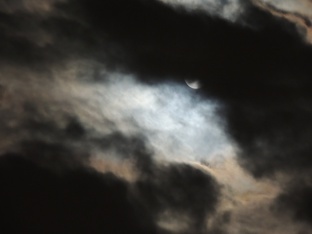 It’s a paradox, to me, that the best way to prolong grief is to try to avoid it by not acknowledging it or running from it, while the quickest and healthiest way through grief is to face it, acknowledge it, and experience it instead of avoiding it or running from it. I’ve had some experience at both. They both hurt like Hell. In past blogs, I equated grief to the darkness of night…the absence of light. Some people are afraid of the dark…and grief…so they try to avoid it or run from it. If one chases the sun to try to stay in the light, one will only get tired and scared that the darkness will overcome them and, eventually, it will. When it does, the fear and weariness from running and the time it took to try to avoid the grief, will cause one to huddle in the darkness to try to wait out the night or the grief itself. I believe this does the most damage to one’s self and eventually hurts the worst.
It’s a paradox, to me, that the best way to prolong grief is to try to avoid it by not acknowledging it or running from it, while the quickest and healthiest way through grief is to face it, acknowledge it, and experience it instead of avoiding it or running from it. I’ve had some experience at both. They both hurt like Hell. In past blogs, I equated grief to the darkness of night…the absence of light. Some people are afraid of the dark…and grief…so they try to avoid it or run from it. If one chases the sun to try to stay in the light, one will only get tired and scared that the darkness will overcome them and, eventually, it will. When it does, the fear and weariness from running and the time it took to try to avoid the grief, will cause one to huddle in the darkness to try to wait out the night or the grief itself. I believe this does the most damage to one’s self and eventually hurts the worst.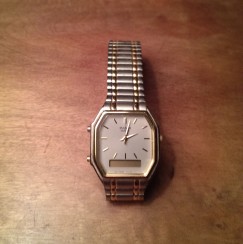 and dealt with. It helped me to join a bereavement group to be with others who were experiencing the same kind of grief over the same type of loss. There is strength in numbers there. There is a kinship, a commonality among these people, no matter their race, creed, or social status. There is only loss and grief, and acceptance of what you are going through. There is no judgement, there is no right or wrong way to grieve because grief just is, and there is no timetable because everyone there knows how personal grief is. It can take weeks, months, or years to heal from grief. Yet, it is the passage of that time as well as a belief, a faith that the grief will ease, that will make it so. I also believe that a faith in God helps, too, because it is difficult enough to go through this alone. When I was away from my bereavement group, I spent a lot of time talking with God, both in anger and begging for patience and a respite from the pain of my loss. He is big enough to take it all, and kind enough to grant me the respite when I needed it. I promise that it does get better, the pain does subside, good memories will vastly outnumber the bad ones, and life will get better. With Time. Be patient with yourself.
and dealt with. It helped me to join a bereavement group to be with others who were experiencing the same kind of grief over the same type of loss. There is strength in numbers there. There is a kinship, a commonality among these people, no matter their race, creed, or social status. There is only loss and grief, and acceptance of what you are going through. There is no judgement, there is no right or wrong way to grieve because grief just is, and there is no timetable because everyone there knows how personal grief is. It can take weeks, months, or years to heal from grief. Yet, it is the passage of that time as well as a belief, a faith that the grief will ease, that will make it so. I also believe that a faith in God helps, too, because it is difficult enough to go through this alone. When I was away from my bereavement group, I spent a lot of time talking with God, both in anger and begging for patience and a respite from the pain of my loss. He is big enough to take it all, and kind enough to grant me the respite when I needed it. I promise that it does get better, the pain does subside, good memories will vastly outnumber the bad ones, and life will get better. With Time. Be patient with yourself.
 December, 2016, was an interesting and busy month. There was a lot of preparation for Christmas, including shopping for my grandchildren and Debbie, wrapping the presents, putting up and decorating the tree, setting up the Christmas village on the fireplace hearth, complete with the HO-scale cable car, setting up the Crèche…the wooden stable I built and small ceramic figures I painted to remind us that our Savior was sent to save the lowliest of us, and then practicing playing the guitar and singing the Christmas version of Hallelujah by Cloverton because my pastor asked if I would sing it at the 11:00pm Christmas Eve service. Debbie and I spent a wonderful, quiet Christmas Eve together, enjoying a movie and each other’s company, and then went to the 11:00 pm service at our church.
December, 2016, was an interesting and busy month. There was a lot of preparation for Christmas, including shopping for my grandchildren and Debbie, wrapping the presents, putting up and decorating the tree, setting up the Christmas village on the fireplace hearth, complete with the HO-scale cable car, setting up the Crèche…the wooden stable I built and small ceramic figures I painted to remind us that our Savior was sent to save the lowliest of us, and then practicing playing the guitar and singing the Christmas version of Hallelujah by Cloverton because my pastor asked if I would sing it at the 11:00pm Christmas Eve service. Debbie and I spent a wonderful, quiet Christmas Eve together, enjoying a movie and each other’s company, and then went to the 11:00 pm service at our church.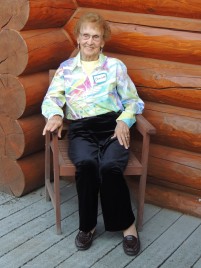 The first afternoon of the reunion, a Friday, I was sitting at a table at the lodge talking with a couple of people I hadn’t seen since the last reunion I attended, when I saw Aunt Charlotte. I excused myself to go say hello to her. She smiled at me and asked me to sit and chat. She told me she was glad I had decided to come. I told her I hadn’t planned on it until Lou’s sisters had called me. I had thought it was more their family reunion than mine, that I had married into the family and was kind of an “outlaw.” She laughed and patted my hand and told me that once, a long time, ago, she was an “outlaw,” too, because she married into the family. And now she was the matriarch! She was one of the first to tell me that I was part of the family and she wasn’t going to let me out of it because that’s the way families go on. And if I should find someone else and even remarry, she—as well as her children, if she had any—would become part of the family, too. That’s just the way it was.
The first afternoon of the reunion, a Friday, I was sitting at a table at the lodge talking with a couple of people I hadn’t seen since the last reunion I attended, when I saw Aunt Charlotte. I excused myself to go say hello to her. She smiled at me and asked me to sit and chat. She told me she was glad I had decided to come. I told her I hadn’t planned on it until Lou’s sisters had called me. I had thought it was more their family reunion than mine, that I had married into the family and was kind of an “outlaw.” She laughed and patted my hand and told me that once, a long time, ago, she was an “outlaw,” too, because she married into the family. And now she was the matriarch! She was one of the first to tell me that I was part of the family and she wasn’t going to let me out of it because that’s the way families go on. And if I should find someone else and even remarry, she—as well as her children, if she had any—would become part of the family, too. That’s just the way it was.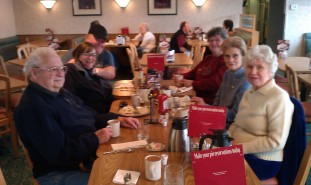 Now there were six of us, three men and three women, and for the next three years we continued to meet for brunch every Tuesday morning at 11:00am. We had not only become good friends, we had become family. During that time, I had met Debbie, fallen in love, and brought her to introduce her to the group. Don had met Linda, fallen in love and remarried. Linda became part of the group. Over those three years, we had become more of a friendship group than a bereavement group, though R.J. would still get choked up every time he mentioned his wife’s name. It wasn’t long after we began meeting at the restaurant, about three years after he lost his wife, that R.J. lost his second oldest daughter. She was only fifty-four years old, as I recall. The Brunch Bunch attended her memorial service to let R.J. know that we were there for him. Despite this, we watched R.J. become emotionally stronger, more outgoing, and more talkative as the months wore on. He had a great sense of humor, liked pretty, young ladies, loved to go to the casinos, looked forward to our brunches, and had a great appetite. And he loved his cherry pie! He kept us laughing with his jokes and stories, and was loved by all of us. During one of our after-brunch chats, he told me he had wondered why he was still around. He missed his wife so much. It seemed as though he was just biding his time until it was his time. He said he was ready to go whenever the Lord wanted to take him.
Now there were six of us, three men and three women, and for the next three years we continued to meet for brunch every Tuesday morning at 11:00am. We had not only become good friends, we had become family. During that time, I had met Debbie, fallen in love, and brought her to introduce her to the group. Don had met Linda, fallen in love and remarried. Linda became part of the group. Over those three years, we had become more of a friendship group than a bereavement group, though R.J. would still get choked up every time he mentioned his wife’s name. It wasn’t long after we began meeting at the restaurant, about three years after he lost his wife, that R.J. lost his second oldest daughter. She was only fifty-four years old, as I recall. The Brunch Bunch attended her memorial service to let R.J. know that we were there for him. Despite this, we watched R.J. become emotionally stronger, more outgoing, and more talkative as the months wore on. He had a great sense of humor, liked pretty, young ladies, loved to go to the casinos, looked forward to our brunches, and had a great appetite. And he loved his cherry pie! He kept us laughing with his jokes and stories, and was loved by all of us. During one of our after-brunch chats, he told me he had wondered why he was still around. He missed his wife so much. It seemed as though he was just biding his time until it was his time. He said he was ready to go whenever the Lord wanted to take him.
 Yes, as I get older, I am becoming more thankful for things that are not things but, rather, matters of the heart…for sharing, for gentleness, for understanding, for giving, for kindness, for peace, for love. Oh! And by the way (lest we forget), it’s also the season that many of us celebrate that from which Christianity is derived…the birth of the Christ Child in a barn in a town called Bethlehem over two thousand years ago. I am truly thankful for that miracle! Thanks be to God!
Yes, as I get older, I am becoming more thankful for things that are not things but, rather, matters of the heart…for sharing, for gentleness, for understanding, for giving, for kindness, for peace, for love. Oh! And by the way (lest we forget), it’s also the season that many of us celebrate that from which Christianity is derived…the birth of the Christ Child in a barn in a town called Bethlehem over two thousand years ago. I am truly thankful for that miracle! Thanks be to God!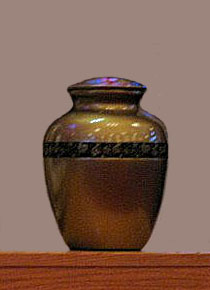
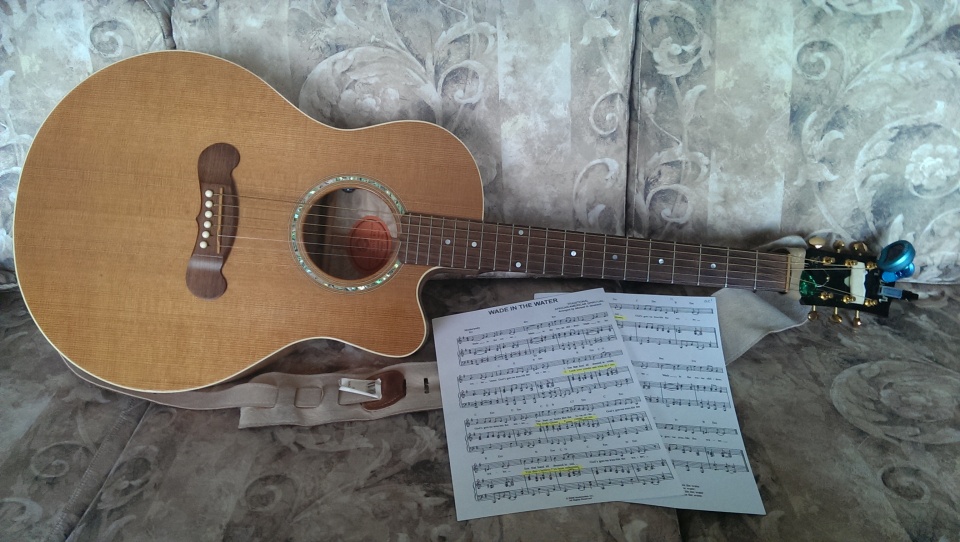 In the Lutheran church, as in many Christian churches, it is called Confirmation, a “public profession of faith prepared for by long and careful instruction.” Last Sunday at church it was called Affirmation, as in “affirmation of one’s baptism into the faith.” I was going to sing, “Wade in the Water” for the affirmations of their baptisms. Pastor Jan thought it would be most fitting. I thought it was, too. I was honored she wanted me to sing it however the spirit moved me.
In the Lutheran church, as in many Christian churches, it is called Confirmation, a “public profession of faith prepared for by long and careful instruction.” Last Sunday at church it was called Affirmation, as in “affirmation of one’s baptism into the faith.” I was going to sing, “Wade in the Water” for the affirmations of their baptisms. Pastor Jan thought it would be most fitting. I thought it was, too. I was honored she wanted me to sing it however the spirit moved me.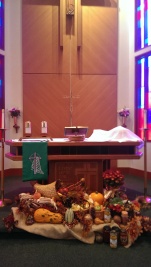 I have been blessed to be a small part of many people’s lives, and even more blessed that they have been part of my life. This journey through life is everything to me. It’s taught me things, especially how to learn from my experiences, how to be appreciative and grateful for what I have and for what I’ve seen, for all the people I’ve known, and all the things I’ve gone through…good and bad…because those things have brought beauty, knowledge and empathy to me, taught me how to treat others, and it’s all taught me how to give back. Most of all, though, I am grateful and blessed for the love I’ve received, and the love left in me to give back and pay forward. Thanks be to God for a special weekend!
I have been blessed to be a small part of many people’s lives, and even more blessed that they have been part of my life. This journey through life is everything to me. It’s taught me things, especially how to learn from my experiences, how to be appreciative and grateful for what I have and for what I’ve seen, for all the people I’ve known, and all the things I’ve gone through…good and bad…because those things have brought beauty, knowledge and empathy to me, taught me how to treat others, and it’s all taught me how to give back. Most of all, though, I am grateful and blessed for the love I’ve received, and the love left in me to give back and pay forward. Thanks be to God for a special weekend!